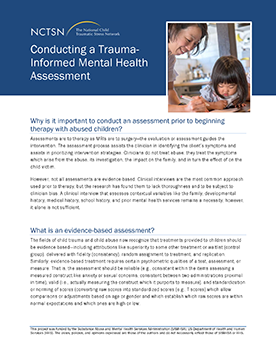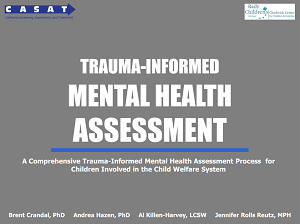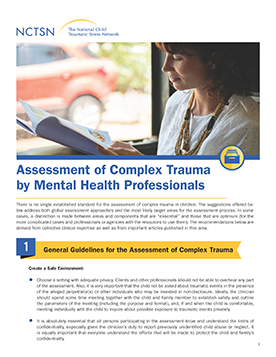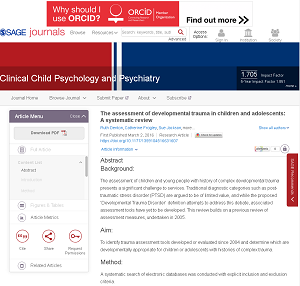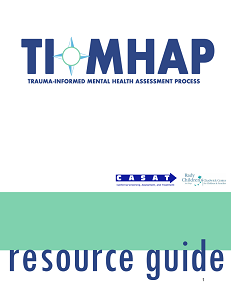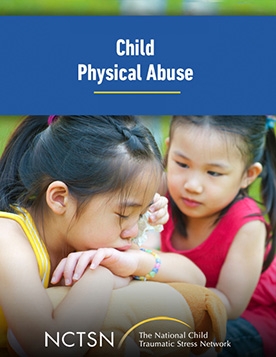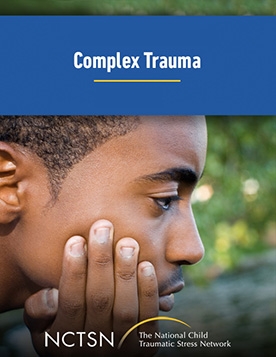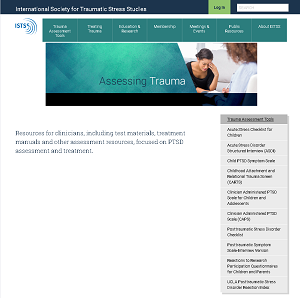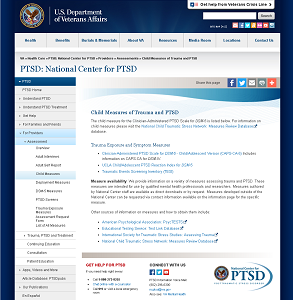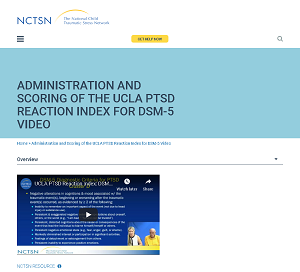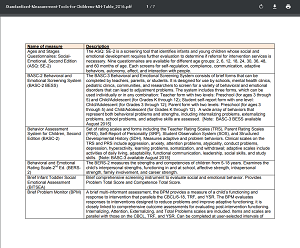-
Conducting a Trauma-Informed Mental Health Assessment in a CAC
Assessment Practices
National Child Traumatic Stress Network (NCTSN)Behavioral HealthThis fact sheet provides information on why conducting a trauma-informed mental health assessment is important for those working in a CAC
-
Family Trauma Assessment: Tips for Clinicians
Assessment Practices
National Child Traumatic Stress Network (NCTSN)Behavioral HealthThis fact sheet details the importance of trauma assessment and guides clinicians in the assessment process. It includes information on engagement, best practices in trauma assessment, measurement, and feedback.
-
Comprehensive Trauma-Informed MH Assessment Process Slides: 5 Approaches to Using Measurement in Children’s MH Systems
Assessment Practices
Chadwick Center for Children and FamiliesChild WelfareThis presentation provides an introduction to the TI-MAP model, assessment principles, and key elements .
-
Assessment of Complex Trauma by Mental Health Professionals
Assessment Practices
National Child Traumatic Stress Network (NCTSN)Behavioral HealthThis document provides general guidelines and helpful tips for assessing complex trauma in children and youth. They provide recommendations derived from clinical expertise and published articles.
-
Empirically-Guided Assessment of Complex Trauma for Children in Foster Care: A Focus on Appropriate Diagnosis of Attachment Concerns
Assessment Practices
Psychological Services JournalBehavioral HealthThis article provides an overview of complex trauma and its effects, with a focus on attachment concerns. It subsequently describes one statewide assessment program for youth in the child welfare system with a history of experiencing complex trauma, elaborating on strengths and areas of future growth. A case study demonstrates the program’s adherence to established guidelines and the resulting diagnoses and recommendations.
-
The Assessment of Developmental Trauma in Children and Adolescents: A Systematic Review
Assessment Practices
Clinical Child Psychology and PsychiatryBehavioral HealthThis article reviews assessment tools developed since 2004 and examines them in the context of assessing and diagnosing complex trauma
-
Trauma Informed Mental Health Assessment Process (TI-MHAP) Resource Guide
Assessment Practices
Chadwick Center for Children and FamiliesBehavioral HealthTI-MHAP is a trauma-informed assessment process that utilizes standardized assessment measures and assessment-based treatment to help guide the decisions made throughout the course of treatment for children.
-
Trauma Informed Mental Health Assessment Process (TI-MHAP) Resource Guide
Assessment Practices
Chadwick Center for Children and FamiliesBehavioral HealthTI-MHAP is a trauma-informed assessment process that utilizes standardized assessment measures and assessment-based treatment to help guide the decisions made throughout the course of treatment for children.
-
Assessment of Child Physical Abuse 2: Clinical and Forensic Perspectives
Assessment Practices
National Child Traumatic Stress Network (NCTSN)Behavioral HealthThis webinar offered through the Learning Center of the NCTSN discusses key components of clinical assessment for child physical abuse.
-
Comprehensive Assessment of Complex Trauma
Assessment Practices
National Child Traumatic Stress Network (NCTSN)Behavioral HealthThis webinar offered through the Learning Center of the NCTSN discusses general and trauma-specific tools used to assess complex trauma in children and adolescents and how assessment guides treatment for this population.
-
Trauma Assessment
Assessment Practices
National Child Traumatic Stress Network (NCTSN)Behavioral HealthThis webinar offered through the Learning Center of the NCTSN outlines major issues associated with the assessment of trauma in children and adolescents.
-
Application of the CANS-Trauma in relation to Trauma-Informed Treatment and Services Assessment
Assessment Practices
National Child Traumatic Stress Network (NCTSN)Behavioral HealthThis webinar offered through the Learning Center of the NCTSN provides an overview of the CANS and FANS Trauma tools in relation to trauma-informed assessment.
-
An Overview of the Child and Adolescent Trauma Screen (CATS)
Assessment Practices
Arkansas Building Effective Services for Trauma (ARBEST)Behavioral HealthThe Child and Adolescent Trauma Screen (CATS) is a research-based, psychometrically valid and reliable screening tool for posttraumatic stress symptoms. During this webinar participants will learn basic information on administration, scoring, and interpretation.
-
Assessment of Child Physical Abuse 2: Clinical and Forensic Perspectives
Assessment Practices
National Child Traumatic Stress Network (NCTSN)Behavioral HealthThis webinar offered through the Learning Center of the NCTSN discusses key components of clinical assessment for child physical abuse.
-
Comprehensive Assessment of Complex Trauma
Assessment Practices
National Child Traumatic Stress Network (NCTSN)Behavioral HealthThis webinar offered through the Learning Center of the NCTSN discusses general and trauma-specific tools used to assess complex trauma in children and adolescents and how assessment guides treatment for this population.
-
Trauma Assessment
Assessment Practices
National Child Traumatic Stress Network (NCTSN)Behavioral HealthThis webinar offered through the Learning Center of the NCTSN outlines major issues associated with the assessment of trauma in children and adolescents.
-
Application of the CANS-Trauma in relation to Trauma-Informed Treatment and Services Assessment
Assessment Practices
National Child Traumatic Stress Network (NCTSN)Behavioral HealthThis webinar offered through the Learning Center of the NCTSN provides an overview of the CANS and FANS Trauma tools in relation to trauma-informed assessment.
-
An Overview of the Child and Adolescent Trauma Screen (CATS)
Assessment Practices
Arkansas Building Effective Services for Trauma (ARBEST)Behavioral HealthThe Child and Adolescent Trauma Screen (CATS) is a research-based, psychometrically valid and reliable screening tool for posttraumatic stress symptoms. During this webinar participants will learn basic information on administration, scoring, and interpretation.
-
Assessing Trauma
Assessment Practices
International Society for Traumatic Stress Studies (ISTSS)Behavioral HealthThis website provides a link to trauma assessment tools for childhood PTSD.
-
Attitudes Related to Trauma-Informed Care (ARTIC) Scale
Assessment Practices
Trauma Stress InstituteGeneralThe ARTIC Scale is a psychometrically-validated measure of professional and paraprofessional attitudes toward trauma-informed care. This website offers information about the measure and a link to purchase the measure.
-
Child Measures of Trauma and PTSD
Assessment Practices
U.S. Department of Veterans AffairsBehavioral HealthThis website provides a list of measures for PTSD in children intended for qualified mental health professionals.
-
Administration and Scoring of the UCLA PTSD Reaction Index for DSM-5 Video
Assessment Practices
National Child Traumatic Stress Network (NCTSN)Behavioral HealthThis informational video goes over how to administer and score the UCLA PTSD Reaction Index for DSM-V.
-
Standardized Measurement Tools for Children’s MH Table
Assessment Practices
Chadwick Center for Children and FamiliesGeneralThis table provides a list of standardized measures for use with children and adolescents for a variety of mental health concerns.
